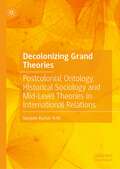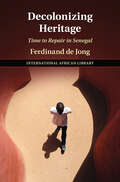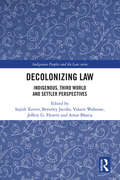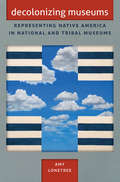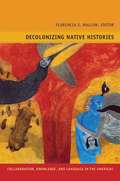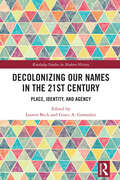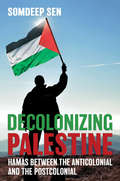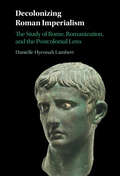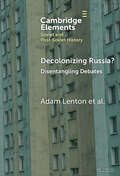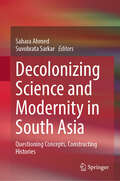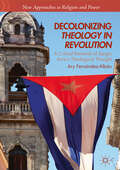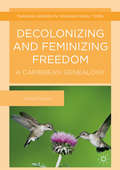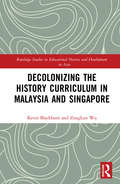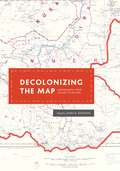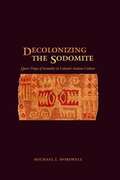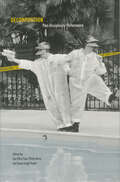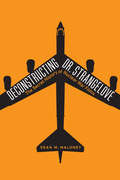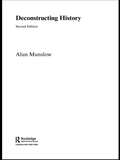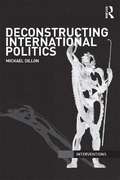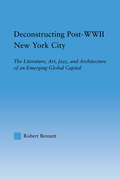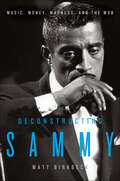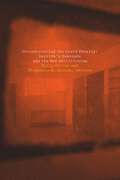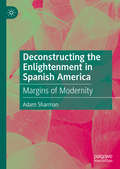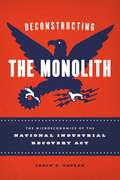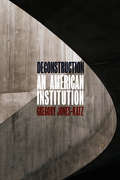- Table View
- List View
Decolonizing Grand Theories: Postcolonial Ontology, Historical Sociology and Mid-Level Theories in International Relations
by Sanjeev Kumar H.M.This book examines the modes by which the grand theories of International Relations can be restructured at the level of meta-theory. It emphasizes the inability of grand theories to make sense of international relations in postcolonial societies and argues to engage in such restructuring in the domain of ontology. This is done by making a historical sociological defence toward adopting mid-level theories in IR. It is a critique of the meta-theoretical foundations of Kenneth Waltz's grand theory of neorealism, by pivoting itself upon the framework of postcolonial ontology. Dwelling upon Mohammed Ayoob’s mid-level theory of subaltern realism, it argues for undertaking the task of restructuring International Relations at the level of meta-theory, largely in the sphere of ontology. It explains how the thrust of grand theories such as neorealism, on ontological singularity can be circumvented. Owing to this, International Relations can experience a meta-theoretical transformation that may manifest in the broader engagement of the discipline itself, with the very conception of ontological multiplicity.
Decolonizing Heritage: Time to Repair in Senegal (The International African Library #65)
by Ferdinand De JongSenegal features prominently on the UNESCO World Heritage List. As many of its cultural heritage sites are remnants of the French empire, how does an independent nation care for the heritage of colonialism? How does it reinterpret slave barracks, colonial museums, and monuments to empire to imagine its own national future? This book examines Senegal's decolonization of its cultural heritage. Revealing how Léopold Sédar Senghor's philosophy of Négritude inflects the interpretation of its colonial heritage, Ferdinand de Jong demonstrates how Senegal's reinterpretation of heritage sites enables it to overcome the legacies of the slave trade, colonialism, and empire. Remembering and reclaiming a Pan-African future, De Jong shows how World Heritage sites are conceived as the archive of an Afrotopia to come, and, in a move towards decolonization, how they repair colonial time.
Decolonizing Law: Indigenous, Third World and Settler Perspectives (Indigenous Peoples and the Law)
by Sujith Xavier; Beverley Jacobs; Valarie Waboose; Jeffery G. Hewitt; Amar BhatiaThis book brings together Indigenous, Third World and Settler perspectives on the theory and practice of decolonizing law. Colonialism, imperialism, and settler colonialism continue to affect the lives of racialized communities and Indigenous Peoples around the world. Law, in its many iterations, has played an active role in the dispossession and disenfranchisement of colonized peoples. Law and its various institutions are the means by which colonial, imperial, and settler colonial programs and policies continue to be reinforced and sustained. There are, however, recent and historical examples in which law has played a significant role in dismantling colonial and imperial structures set up during the process of colonization. This book combines usually distinct Indigenous, Third World and Settler perspectives in order to take up the effort of decolonizing law: both in practice and in the concern to distance and to liberate the foundational theories of legal knowledge and academic engagement from the manifestations of colonialism, imperialism and settler colonialism. Including work by scholars from the Global South and North, this book will be of interest to academics, students and others interested in the legacy of colonial and settler law, and its overcoming.
Decolonizing Museums
by Amy LonetreeMuseum exhibitions focusing on Native American history have long been curator controlled. However, a shift is occurring, giving Indigenous people a larger role in determining exhibition content. In Decolonizing Museums, Amy Lonetree examines the complexities of these new relationships with an eye toward exploring how museums can grapple with centuries of unresolved trauma as they tell the stories of Native peoples. She investigates how museums can honor an Indigenous worldview and way of knowing, challenge stereotypical representations, and speak the hard truths of colonization within exhibition spaces to address the persistent legacies of historical unresolved grief in Native communities.Lonetree focuses on the representation of Native Americans in exhibitions at the Smithsonian's National Museum of the American Indian, the Mille Lacs Indian Museum in Minnesota, and the Ziibiwing Center of Anishinabe Culture and Lifeways in Michigan. Drawing on her experiences as an Indigenous scholar and museum professional, Lonetree analyzes exhibition texts and images, records of exhibition development, and interviews with staff members. She addresses historical and contemporary museum practices and charts possible paths for the future curation and presentation of Native lifeways.
Decolonizing Native Histories: Collaboration, Knowledge, and Language in the Americas
by Florencia E. Mallon Gladys MccormickDecolonizing Native Histories is an interdisciplinary collection that grapples with the racial and ethnic politics of knowledge production and indigenous activism in the Americas. It analyzes the relationship of language to power and empowerment, and advocates for collaborations between community members, scholars, and activists that prioritize the rights of Native peoples to decide how their knowledge is used. The contributors--academics and activists, indigenous and nonindigenous, from disciplines including history, anthropology, linguistics, and political science--explore the challenges of decolonization.These wide-ranging case studies consider how language, the law, and the archive have historically served as instruments of colonialism and how they can be creatively transformed in constructing autonomy. The collection highlights points of commonality and solidarity across geographical, cultural, and linguistic boundaries and also reflects deep distinctions between North and South. Decolonizing Native Histories looks at Native histories and narratives in an internationally comparative context, with the hope that international collaboration and understanding of local histories will foster new possibilities for indigenous mobilization and an increasingly decolonized future.
Decolonizing Our Names in the 21st Century: Place, Identity, and Agency (Routledge Studies in Modern History)
by Lauren Beck Grace A. GomashieThis book combines different decolonial approaches from around the world to offer a roadmap for updating names and naming practices, restoring and protecting precolonial ones, and reimagining or recontextualizing the relationship between place, identity, and names.In a postcolonial context, naming often serves as a bitter reminder of past harms through commemorative naming practices, whether through a system of baptismal names or a former colony’s approach to dealing with the names that the colonizer left behind. This volume assembles authors who hail from formerly colonized regions of the Americas, Europe, Africa, and Asia to engage with this problem of decolonizing names in the twenty-first century from a global perspective. The book also points to what strategies have had more success than others while envisioning the tools needed for progress in the future.Offering a useful framework with approaches that can easily be used across other geographical contexts, this volume is suitable for scholars and students interested in decolonization, identity, and naming practices.
Decolonizing Palestine: Hamas between the Anticolonial and the Postcolonial
by Somdeep SenIn Decolonizing Palestine, Somdeep Sen rejects the notion that liberation from colonialization exists as a singular moment in history when the colonizer is ousted by the colonized. Instead, he considers the case of the Palestinian struggle for liberation from its settler colonial condition as a complex psychological and empirical mix of the colonial and the postcolonial. Specifically, he examines the two seemingly contradictory, yet coexistent, anticolonial and postcolonial modes of politics adopted by Hamas following the organization's unexpected victory in the 2006 Palestinian Legislative Council election. Despite the expectations of experts, Hamas has persisted as both an armed resistance to Israeli settler colonial rule and as a governing body. Based on ethnographic material collected in the Gaza Strip, the West Bank, Israel, and Egypt, Decolonizing Palestine argues that the puzzle Hamas presents is not rooted in predicting the timing or process of its abandonment of either role. The challenge instead lies in explaining how and why it maintains both, and what this implies for the study of liberation movements and postcolonial studies more generally.
Decolonizing Roman Imperialism: The Study of Rome, Romanization, and the Postcolonial Lens
by Danielle Hyeonah LambertThe framework of 'Romanization' developed by Haverfield in 1905 - that Romans 'civilized' their imperial subjects, particularly those in the 'barbarian' western provinces - remains hegemonic, notwithstanding multiple attempts at revisionism. It has been reasserted, rejected, or modified, but still frames the debate. Decolonizing Roman Imperialism investigates how the postcolonial challenge to decolonize the production of historical knowledge has motivated Roman scholars to question the paradigm of Romanization: to review its historiography, to seek fresh approaches, and to rewrite it. The book provides an intellectual genealogy of the debate valuable for every student of the Roman Empire and of Roman Britain, and invites them to rethink the legacy of ancient Roman imperialism.
Decolonizing Russia?: Disentangling Debates (Elements in Soviet and Post-Soviet History)
by Adam LentonRussia's full-scale invasion of Ukraine in February 2022 radically changed the way many viewed the nature of the Russian state. The centrality of resentment and imperial nostalgia in Russian narratives led many to argue that Russian imperialism was a key force behind the invasion. By extension, this led to the idea that decolonization – largely in scholarship, but also among some policy circles – offered a way to better understanding Russia in this new context. To this end, this Element examines the debates over decolonization in the Russian case. It begins by contextualizing these debates through an examination of Russia's historical development as an empire. It then identifies and disentangles three key focal points: decolonization as domestic Russian politics, the transnational politics of decolonization, and decolonization as a scholarly endeavor. By doing so, this Element shows where decolonization has merit, but also where it is contested or limited.
Decolonizing Science and Modernity in South Asia: Questioning Concepts, Constructing Histories
by Suvobrata Sarkar Sahara AhmedThis book offers a unique perspective on the colonial roots of modern science, technology, and medicine (STM) in South Asia. The book questions the deconstruction of imperial visions and definitions of science and modernity in South Asia. It presents an in-depth analysis of the contested relationship between science, modernity, and colonialism. It explores how new research can contribute to the diversification of perspectives in the history and sociology of modern South Asian studies. The chapters in the book delve into various aspects of STM in South Asia. It covers diverse topics, including the social, cultural, and pedagogic context of early modern Bengal, the popularization of science in colonial Punjab, the Hindi science periodical Vigyan, and the emergence of the Indian science community. The book also examines the intersection of indigenous medical practices, ayurveda, Unani, and medical revivalism and highlights peripheral creativity in science. The contributors engage with the existing historiography to raise new questions concerning the global circulations of scientific knowledge from the perspective of South Asia and the regional appropriation of the same. It connects the history of science and modernity with South Asia's socio-economic and cultural background. It offers valuable insights into the decolonization of STM. It greatly interests scholars and students of modern South Asian history, sociology, social anthropology, and Science, Technology and Society Studies (STS).
Decolonizing Theology in Revolution: A Critical Retrieval of Sergio Arce´s Theological Thought (New Approaches to Religion and Power)
by Ary Fernández-AlbánDrawing on decolonial perspective, this book provides a critical retrieval of Sergio Arce’s theological thought, and proposes it as a source of inspiration to continue renewing liberation theologies in Cuba and in Latin America. In light of current social contexts in Cuba and abroad, this volume examines the relevance of Arce’s theological legacy, identifying significant contributions and also key limitations. It presents a panoramic view of the historical contexts previous to Arce’s articulation of his theology, and also reconstructs the various stages of the development of his theology by reviewing his major writings from the early 1960s to the late 1990s. Bringing Arce into a conversation with other recognized Latin American liberation theologians, this book delivers a reconstruction of his major theological insights related to discourses and practices of liberation, highlighting important similarities and differences between their approaches.
Decolonizing and Feminizing Freedom: A Caribbean Genealogy (Thinking Gender in Transnational Times)
by Denise NobleThis book traces the powerful discourses and embodied practices through which Black Caribbean women have been imagined and produced as subjects of British liberal rule and modern freedom. It argues that in seeking to escape liberalism’s gendered and racialised governmentalities, Black women’s everyday self-making practices construct decolonising and feminising epistemologies of freedom. These, in turn, repeatedly interrogate the colonial logics of liberalism and Britishness. Genealogically structured, the book begins with the narratives of freedom and identity presented by Black British Caribbean women. It then analyses critical moments of crisis in British racial rule at home and abroad in which gender and Caribbean women figure as points of concern. Post-war Caribbean immigration to the UK, decolonisation of the British Caribbean and the post-emancipation reconstruction of the British Caribbean loom large in these considerations. In doing all of this, the author unravels the colonial legacies that continue to underwrite contemporary British multicultural anxieties. This thought-provoking work will appeal to students and scholars of social and cultural history, politics, feminism, race and postcoloniality.
Decolonizing the History Curriculum in Malaysia and Singapore (Routledge Studies in Educational History and Development in Asia)
by Kevin Blackburn ZongLun WuDecolonizing the History Curriculum in Malaysia and Singapore is a unique study in the history of education because it examines decolonization in terms of how it changed the subject of history in the school curriculum of two colonized countries – Malaysia and Singapore. Blackburn and Wu’s book analyzes the transition of the subject of history from colonial education to postcolonial education, from the history syllabus upholding the colonial order to the period after independence when the history syllabus became a tool for nation-building. Malaysia and Singapore are excellent case studies of this process because they once shared a common imperial curriculum in the English language schools that was gradually ‘decolonized’ to form the basis of the early history syllabuses of the new nation-states (they were briefly one nation-state in the early to mid-1960s). The colonial English language history syllabus was ‘decolonized’ into a national curriculum that was translated for the Chinese, Malay, and Tamil schools of Malaysia and Singapore. By analyzing the causes and consequences of the dramatic changes made to the teaching of history in the schools of Malaya and Singapore as Britain ended her empire in Southeast Asia, Blackburn and Wu offer fascinating insights into educational reform, the effects of decolonization on curricula, and the history of Malaysian and Singaporean education.
Decolonizing the Map: Cartography from Colony to Nation (The\kenneth Nebenzahl Jr. Lectures In The History Of Cartography Ser.)
by James R. AkermanAlmost universally, newly independent states seek to affirm their independence and identity by making the production of new maps and atlases a top priority. For formerly colonized peoples, however, this process neither begins nor ends with independence, and it is rarely straightforward. Mapping their own land is fraught with a fresh set of issues: how to define and administer their territories, develop their national identity, establish their role in the community of nations, and more. The contributors to Decolonizing the Map explore this complicated relationship between mapping and decolonization while engaging with recent theoretical debates about the nature of decolonization itself. These essays, originally delivered as the 2010 Kenneth Nebenzahl, Jr., Lectures in the History of Cartography at the Newberry Library, encompass more than two centuries and three continents—Latin America, Africa, and Asia. Ranging from the late eighteenth century through the mid-twentieth, contributors study topics from mapping and national identity in late colonial Mexico to the enduring complications created by the partition of British India and the racialized organization of space in apartheid and post-apartheid South Africa. A vital contribution to studies of both colonization and cartography, Decolonizing the Map is the first book to systematically and comprehensively examine the engagement of mapping in the long—and clearly unfinished—parallel processes of decolonization and nation building in the modern world.
Decolonizing the Sodomite: Queer Tropes of Sexuality in Colonial Andean Culture
by Michael J. HorswellEarly Andean historiography reveals a subaltern history of indigenous gender and sexuality that saw masculinity and femininity not as essential absolutes. Third-gender ritualists, Ipas, mediated between the masculine and feminine spheres of culture in important ceremonies and were recorded in fragments of myths and transcribed oral accounts. Ritual performance by cross-dressed men symbolically created a third space of mediation that invoked the mythic androgyne of the pre-Hispanic Andes. The missionaries and civil authorities colonizing the Andes deemed these performances transgressive and sodomitical. In this book, Michael J. Horswell examines alternative gender and sexuality in the colonial Andean world, and uses the concept of the third gender to reconsider some fundamental paradigms of Andean culture. By deconstructing what literary tropes of sexuality reveal about Andean pre-Hispanic and colonial indigenous culture, he provides an alternative history and interpretation of the much-maligned aboriginal subjects the Spanish often referred to as "sodomites." Horswell traces the origin of the dominant tropes of masculinist sexuality from canonical medieval texts to early modern Spanish secular and moralist literature produced in the context of material persecution of effeminates and sodomites in Spain. These values traveled to the Andes and were used as powerful rhetorical weapons in the struggle to justify the conquest of the Incas.
Decomposition: Post-Disciplinary Performance (Unnatural Acts: Theorizing the Performative)
by Sue-Ellen Case, Philip Brett, and Susan Leigh Foster“A collection of essays in a variety of disciplines that confront oppressed, marginalized, and invisible space . . . an astonishing array of material.” —Theatre Research InternationalThe fluid nature of performance studies and the widening embrace of the idea of performativity have come together in Decomposition to produce a collection that crosses disciplinary lines of academic work. The essays move from the local to the global, from history to sport, from body parts to stage productions, and from race relations to global politics.In the title essay, Elizabeth Wood writes about a basic human relation cast around the question of performance and triangulated by the role that a great performer took within it. Together these essays pursue critical understandings of performance in our postmodern world.Contributors include Philip Brett, Sue-Ellen Case, Susan Leigh Forster, Amelia Jones, Kristine C. Kuramitsu, George Lipsitz, Catherine Lord, Ronald Radano, Timothy D. Taylor, Jeffrey Tobin, Deborah Wong, Elizabeth Wood, and B. J. Wray“Presents interpretive interventions of a more localized, materially and institutionally anchored, and ultimately more specific and powerful nature.” —TDR/The Drama Review
Deconstructing Dr. Strangelove: The Secret History of Nuclear War Films
by Sean M. MaloneyKing of the Cold War crisis film, Dr. Strangelove became a cultural touchstone from the moment of its release in 1964. The duck-and-cover generation saw it as a satire on nuclear issues and Cold War thinking. Subsequent generations, removed from the film&’s historical moment, came to view it as a quasi-documentary about an unfathomable secret world. Sean M. Maloney uses Dr. Strangelove and other genre classics like Fail Safe and The Bedford Incident to investigate a curious pop cultural contradiction. Nuclear crisis films repeatedly portrayed the failures of the Cold War&’s deterrent system. Yet the system worked. What does this inconsistency tell us about the genre? What does it tell us about the deterrent system, for that matter? Blending film analysis with Cold War history, Maloney looks at how the celluloid crises stack up against reality—or at least as much of reality as we can reconstruct from these films with confidence. The result is a daring intellectual foray that casts new light on Dr. Strangelove, one of the Cold War era&’s defining films.
Deconstructing History
by Alun MunslowIn Deconstructing History, Alun Munslow examines history in the postmodern age. He provides an introduction to the debates and issues of postmodernist history. He also surveys the latest research into the relationship between the past, history and historical practice as well as forwarding his own challenging theories. The book discusses issues of both empiricist and deconstruction positions and considers the arguments of major proponents of both stances, and includes: an examination of the character of historical evidence exploration of the role of historians discussion of the failure of traditional historical methods chapters on Hayden White and Michel Foucault an evaluation of the importance of historical narrative an up to date, comprehensive bibliography an extensive and helpful glossary of difficult key terms. Deconstructing History maps the philosophical field, outlines the controversies involved and assesses the merits of the deconstructionist position. He argues that instead of beginning with the past history begin with its representation by historians.
Deconstructing International Politics (Interventions)
by Michael DillonMichael Dillon is internationally regarded for his contributions by political philosophers, international relations scholars and security studies experts, as well as by philosophers more broadly. It is difficult to overrate his importance to the development of critical deconstructive approaches not only in challenging traditional scholarship and addressing contemporary politics, but in articulating new approaches and new thinking. This book draws together some of his key works and is framed by an introduction written specially for the volume. It is the first full-length work to draw on the insights and techniques of deconstruction to analyse international relations. Influenced primarily by Derrida, it critiques the cornerstones of international relations such as modernity, the state, the subject, security and ethics and justice. This volume will provide an invaluable resource for teaching at undergraduate and postgraduate levels on traditional international relations courses and on the increasing number of specialised courses in critical approaches. Well designed and structured, it is accessible to the novice as well as challenging for the specialist.
Deconstructing Post-WWII New York City: The Literature, Art, Jazz, and Architecture of an Emerging Global Capital (Studies in American Popular History and Culture)
by Robert BennettSituating post-WWII New York literature within the material context of American urban history, this work analyzes how literary movements such as the Beat Generation, the New York poets and Black Arts Moment criticized the spatial restructuring of post-WWII New York City.
Deconstructing Sammy: Music, Money, and Madness
by Matt BirkbeckSammy Davis Jr. lived a storied life. Adored by millions over a six-decade-long career, he was considered an entertainment icon and a national treasure. But despite lifetime earnings that topped $50 million, Sammy died in 1990 near bankruptcy. His estate was declared insolvent, and there was no possibility of itever using Sammy's name or likeness again. It was as if Sammy had never existed. Years later his wife, Altovise, a once-vivacious woman and heir to one of the greatest entertainment legacies of the twentieth century, was living in poverty, and with nowhere else to go, she turned to a former federal prosecutor, Albert "Sonny" Murray, to make one last attempt to resolve Sammy's debts, restore his estate, and revive his legacy. For seven years Sonny probed Sammy's life to understand how someone of great notoriety and wealth could have lost everything, and in the process he came to understand Sammy as a man whose complexity makes for a riveting work of celebrity biography as cultural history.Matt Birkbeck's serious work of investigative journalism unveils the extraordinary story of an international celebrity at the center of a confluence of entertainment, politics, and organized crime, and shows how even Sammy's outsized talent couldn't save him from himself.
Deconstructing the Death Penalty: Derrida's Seminars and the New Abolitionism
by Kelly Oliver, Stephanie M. StraubThis volume represents the first collection of essays devoted exclusively to Jacques Derrida's Death Penalty Seminars, conducted from 1999 to 2001. The volume includes essays from a range of scholars working in philosophy, law, Francophone studies, and comparative literature, including established Derridians, activist scholars, and emerging scholars. These essays attempt to elucidate and expand upon Derrida's deconstruction of the theologico-political logic of the death penalty in order to construct a new form of abolitionism, one not rooted in the problematic logics of sovereign power. These essays provide remarkable insight into Derrida’s ethical and political projects; this volume will not only explore the implications of Derrida’s thought on capital punishment and mass incarceration, but will also help to further elucidate the philosophical groundwork for his later deconstructions of sovereign power and the human/animal divide. Because Derrida is deconstructing the logic of the death penalty, rather than the death penalty itself, his seminars will prove useful to scholars and activists opposing all forms of state sanctioned killing. In compiling this volume, our goals were twofold: first, to make a case for Derrida's continuing importance in debates on capital punishment, mass incarceration, and police brutality, and second, to construct a new, versatile abolitionism, one capable of confronting all forms the death penalty might take.
Deconstructing the Enlightenment in Spanish America: Margins of Modernity
by Adam SharmanThis book is about Enlightenment culture in Spanish America before Independence—in short, there where, according to Hegel, one would least expect to find it. It explores the Enlightenment in texts from five cultural fields: science, history, the periodical press, law, and literature. Texts include the journals of the geodesic expedition to Quito, philosophical histories of the Americas, a year’s work from the Mercurio Peruano, the writings of Mariano Moreno, and Lizardi’s El periquillo sarniento. Each chapter takes one field, one body of writing, and one key question: Is modern science universal? Can one disavow the discourse of progress? What is a “Catholic” Enlightenment? Are Enlightenment reason and sovereignty monological? Must the individual be the normative subject of modernity? The book’s premise is that the above texts not only speak to the contradictions of a doubtless marginalised colonial American Ilustración but illuminate the constitutive aporias of the so-called modern project itself. Drawing on the work of Derrida, but also on both historical and philosophical accounts of the various Enlightenments, this incisive book will be of interest to students of Spanish America and scholars in the fields of postcolonialism and the Enlightenment.
Deconstructing the Monolith: The Microeconomics of the National Industrial Recovery Act (Markets and Governments in Economic History)
by Jason E. TaylorThe National Industrial Recovery Act (NIRA) was enacted by Congress in June of 1933 to assist the nation’s recovery during the Great Depression. Its passage ushered in a unique experiment in US economic history: under the NIRA, the federal government explicitly supported, and in some cases enforced, alliances within industries. Antitrust laws were suspended, and companies were required to agree upon industry-level “codes of fair competition” that regulated wages and hours and could implement anti-competitive provisions such as those fixing prices, establishing production quotas, and imposing restrictions on new productive capacity. The NIRA is generally viewed as a monolithic program, its dramatic and sweeping effects best measurable through a macroeconomic lens. In this pioneering book, however, Jason E. Taylor examines the act instead using microeconomic tools, probing the uneven implementation of the act’s codes and the radical heterogeneity of its impact across industries and time. Deconstructing the Monolith employs a mixture of archival and empirical research to enrich our understanding of how the program affected the behavior and well-being of workers and firms during the two years NIRA existed as well as in the period immediately following its demise.
Deconstruction: An American Institution
by Gregory Jones-KatzThe basic story of the rise, reign, and fall of deconstruction as a literary and philosophical groundswell is well known among scholars. In this intellectual history, Gregory Jones-Katz aims to transform the broader understanding of a movement that has been frequently misunderstood, mischaracterized, and left for dead—even as its principles and influence transformed literary studies and a host of other fields in the humanities. ?Deconstruction begins well before Jacques Derrida’s initial American presentation of his deconstructive work in a famed lecture at Johns Hopkins University in 1966 and continues through several decades of theoretic growth and tumult. While much of the subsequent story remains focused, inevitably, on Yale University and the personalities and curriculum that came to be lumped under the “Yale school” umbrella, Deconstruction makes clear how crucial feminism, queer theory, and gender studies also were to the lifeblood of this mode of thought. Ultimately, Jones-Katz shows that deconstruction in the United States—so often caricatured as a French infection—was truly an American phenomenon, rooted in our preexisting political and intellectual tensions, that eventually came to influence unexpected corners of scholarship, politics, and culture.
